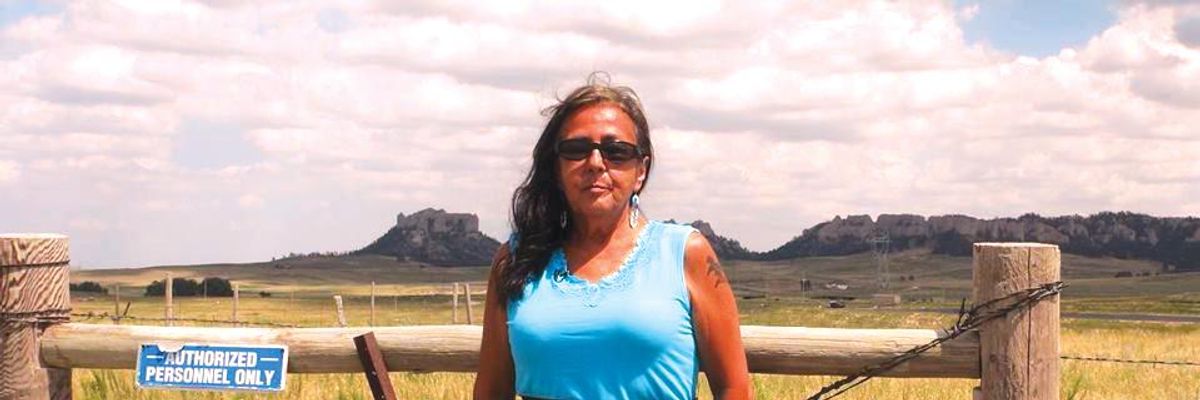Debra White Plume, Wioweya Najin Win in her native Lakota, left her body behind on November 10, 2020. A brave advocate for her people, she was memorialized by the New York Times as a "prominent Native American activist who faced down police bullets, uranium mining companies and oil pipeline projects in trying to protect the traditional Oglala Lakota way of life."
In 1973 she stood with the American Indian Movement during an armed standoff with federal forces that took the lives of two of her comrades at Wounded Knee, and with the Standing Rock encampment to block trespass on native land. Her story is an inspiration to all who pursue justice for the people and the land.
"Debra now joins the grandmothers and grandfathers, but her voice can still be heard."
When I speak with communities looking to halt the fossil fuel industry and other corporate giants, a conversation I had with Debra in December of 2007 often comes to mind. I met Debra at a time when she was organizing opposition to the Cameco Corporation's plans to extend uranium mining into Crow Butte, on Lakota lands, in western Nebraska. I was teaching a "Democracy School" with my colleague Emelyn Lybarger. The school was hosted by the Chadron Native American Center just south of the Pine Ridge Reservation.
As I drew an illustration on a flip-chart, I began the story of the 1819 U.S. Supreme Court case Dartmouth College v. Woodward. We discussed how, in the decision, "justices" John Marshall and Joseph Story redefined states' corporate charters as "private" contracts, discarding their long-held legal status as grants of special privilege from the sovereign people of a state. This transformation of the corporate charter into a "contract" was a key development in corporations' gaining protection under the U.S. Constitution. It was the precursor to the corporate personhood doctrine that the Court would invent at the end of that same century.
This legal maneuver put business corporations on equal footing with states, in terms of being party to a contract. However, the Court also invented the unprecedented notion of "public" corporations, which would have no such contract and thus remained utterly subordinate to the state. "Municipalities are public corporations," I explained. In a competition between the Court's newly minted "contractual" private business corporations and public municipal corporations, municipalities were and continue to be utterly powerless.
When I was finished drawing the graphic relationship between business corporations, municipalities, and states, Debra stood up. She said something I'll never forget. "Hmmm," she said, "so municipalities are the white man's reservations. The only difference is, we know we're on reservations."
That was it. I could imagine no better explanation of how commoners in the United States have been politically, economically, and legally subordinated to the corporate class. Only, most Americans choose to ignore this structure.
I've shared this insight many times over the years. Debra revealed a simple truth that stares non-native Americans in the face, but too-often goes unnoticed. Seen through Debra White Plume's guileless eyes, the humble truth of our kinship and solidarity beneath the real--though disproportionately unequal--oppressions of empire, become clear.
Debra White Plume freed my mind to see a deeper truth with one simple shared observation. And it is that realization that was so clear to Debra, which white people need to accept if we are to enter into meaningful solidarity with indiginous communities and people of color. We're all victims of Empire. Debra now joins the grandmothers and grandfathers, but her voice can still be heard. May her example speak to all our hearts.

